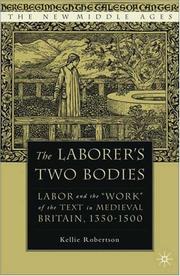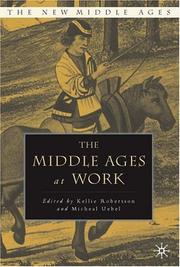| Listing 1 - 10 of 12 | << page >> |
Sort by
|

ISBN: 1403965161 9781403965165 Year: 2005 Volume: *30 Publisher: New York ; Basingstoke Palgrave Macmillan
Abstract | Keywords | Export | Availability | Bookmark
 Loading...
Loading...Choose an application
- Reference Manager
- EndNote
- RefWorks (Direct export to RefWorks)
Labor laws and legislation --- Travail --- History. --- Droit --- Histoire --- Great Britain --- History
Book
ISBN: 1787449092 1843845571 Year: 2020 Publisher: Woodbridge, Suffolk, UK : D. S. Brewer,
Abstract | Keywords | Export | Availability | Bookmark
 Loading...
Loading...Choose an application
- Reference Manager
- EndNote
- RefWorks (Direct export to RefWorks)
New Medieval Literatures is an annual of work on medieval textual cultures, aiming to engage with intellectual and cultural pluralism in the Middle Ages and now. Its scope is inclusive of work across the theoretical, archival, philological, and historicist methodologies associated with medieval literary studies, and embraces the range of European cultures, capaciously defined. Essays in this volume investigate a range of writers from late antiquity to the fifteenth century. They explore encounters between humans and animals in French romance; reflect on what contemporary sound studies can offer to Anglo-French poetry; trace how the reception of Trojan history is influenced by late medieval military practices; attend to the complex multilingualism of a devotional poetry that tests the limits of both language and theology; analyse the ways in which Christ's sexuality upsets religious typology in late medieval drama; document the lines of national and European affinities found in French poetic manuscripts; and argue for why we should study "ugly" manuscripts of practical instruction not only for what they teach us but also for their insights into medieval literacy. Texts discussed include romances such as Chrétien de Troyes's Yvain and Béroul's Tristan; the theologian John of Howden's adaptation of the Philomela legend in his Rossignos; Chaucer's Troilus and Criseyde read alongside siege chronicles of the Hundred Years War; Bruder Hans's quadrilingual Ave Maria; the York Corpus Christi Plays; the poetry of Charles d'Orléans; and a group of late medieval manuscripts which include herbals, account books, and medical treatises.
Literature, Medieval --- History and criticism. --- European culture. --- European literature. --- Medieval literature. --- literary analysis. --- literary perspectives. --- literary studies. --- medieval authors. --- medieval literary history. --- medieval texts. --- textual exploration.
Book
ISBN: 0812248651 0812293673 Year: 2017 Publisher: Philadelphia : University of Pennsylvania Press,
Abstract | Keywords | Export | Availability | Bookmark
 Loading...
Loading...Choose an application
- Reference Manager
- EndNote
- RefWorks (Direct export to RefWorks)
What does it mean to speak for nature? Contemporary environmental critics warn that giving a voice to nonhuman nature reduces it to a mere echo of our own needs and desires; they caution that it is a perverse form of anthropocentrism. And yet nature's voice proved a powerful and durable ethical tool for premodern writers, many of whom used it to explore what it meant to be an embodied creature or to ask whether human experience is independent of the natural world in which it is forged.The history of the late medieval period can be retold as the story of how nature gained an authoritative voice only to lose it again at the onset of modernity. This distinctive voice, Kellie Robertson argues, emerged from a novel historical confluence of physics and fiction-writing. Natural philosophers and poets shared a language for talking about physical inclination, the inherent desire to pursue the good that was found in all things living and nonliving. Moreover, both natural philosophers and poets believed that representing the visible world was a problem of morality rather than mere description. Based on readings of academic commentaries and scientific treatises as well as popular allegorical poetry, Nature Speaks contends that controversy over Aristotle's natural philosophy gave birth to a philosophical poetics that sought to understand the extent to which the human will was necessarily determined by the same forces that shaped the rest of the material world.Modern disciplinary divisions have largely discouraged shared imaginative responses to this problem among the contemporary sciences and humanities. Robertson demonstrates that this earlier worldview can offer an alternative model of human-nonhuman complementarity, one premised neither on compulsory human exceptionalism nor on the simple reduction of one category to the other. Most important, Nature Speaks assesses what is gained and what is lost when nature's voice goes silent.
Nature in literature. --- Poetry, Medieval --- English literature --- Philosophy of nature in literature. --- Literature and science --- Religion and science --- Nature in poetry --- Christianity and science --- Geology --- Geology and religion --- Science --- Science and religion --- Poetry and science --- Science and literature --- Science and poetry --- Science and the humanities --- History and criticism. --- History. --- Religious aspects --- Aristotle --- Jean, --- Guillaume, --- Chaucer, Geoffrey, --- Lydgate, John, --- Lidgate, John --- Lydgate, John --- Lidgate, Iohn --- Monk of Bury --- Monke of Burie --- Monk of Bery --- Chaucer, Jeffrey, --- Chʻiao-sou, Chieh-fu-lei, --- Chieh-fu-lei Chʻiao-sou, --- Choser, Dzheffri, --- Choser, Zheoffreĭ, --- Cosvr, Jvoffrvi, --- Tishūsar, Zhiyūfrī, --- Deguileville, Guillaume de, --- Guillaume de Deguilleville, --- Guillelmo, --- Guillermo, --- William, --- Digulleville, Guillaume de, --- Guilleuila, Guillelmo de, --- Guillevila, Guillelmo de, --- Guilleville, Guillaume de, --- Gralleville, Guillermo de, --- Guillermus, --- Chopinel, Jean, --- Clopinel, Jean, --- De Meun, Jean, --- Jean Chopinel de Meun, --- Jean Clopinel de Meun, --- Jean de Meun, --- Jehan, --- Meun, Jean de, --- Clopinel, J. --- Aristoteles --- Aristote --- Arisṭāṭṭil --- Aristo, --- Aristotel --- Aristotele --- Aristóteles, --- Aristòtil --- Aristotile --- Arisṭū --- Arisṭūṭālīs --- Arisutoteresu --- Arystoteles --- Ya-li-shih-to-te --- Ya-li-ssu-to-te --- Yalishiduode --- Yalisiduode --- Ἀριστοτέλης --- Αριστοτέλης --- Аристотел --- ארסטו --- אריםטו --- אריסטו --- אריסטוטלס --- אריסטוטלוס --- אריסטוטליס --- أرسطاطاليس --- أرسططاليس --- أرسطو --- أرسطوطالس --- أرسطوطاليس --- ابن رشد --- اريسطو --- Pseudo Aristotele --- Pseudo-Aristotle --- アリストテレス --- Influence. --- Criticism and interpretation. --- Knowledge --- Science. --- Romaunt of the Rose.
Book
ISBN: 9780812248654 Year: 2017 Publisher: Philadelphia University of Pennsylvania Press
Abstract | Keywords | Export | Availability | Bookmark
 Loading...
Loading...Choose an application
- Reference Manager
- EndNote
- RefWorks (Direct export to RefWorks)
Nature in literature --- Poetry, Medieval --- English literature --- Philosophy of nature in literature --- Literature and science --- Religion and science --- History and criticism --- History --- Aristoteles --- Jean, --- Guillaume, --- Chaucer, Geoffrey, --- Lydgate, John, --- Influence. --- Criticism and interpretation. --- Knowledge --- Science. --- Romaunt of the Rose.
Book
ISBN: 9780812293678 Year: 2017 Publisher: Philadelphia
Abstract | Keywords | Export | Availability | Bookmark
 Loading...
Loading...Choose an application
- Reference Manager
- EndNote
- RefWorks (Direct export to RefWorks)
Digital
ISBN: 9780812293678 9780812248654 Year: 2017 Publisher: Philadelphia, Pa University of Pennsylvania Press
Abstract | Keywords | Export | Availability | Bookmark
 Loading...
Loading...Choose an application
- Reference Manager
- EndNote
- RefWorks (Direct export to RefWorks)

ISBN: 1403960070 Year: 2004 Volume: *17 Publisher: Basingstoke Palgrave Macmillan
Abstract | Keywords | Export | Availability | Bookmark
 Loading...
Loading...Choose an application
- Reference Manager
- EndNote
- RefWorks (Direct export to RefWorks)
Middeleeuwen --- Middle Ages --- Moyen Âge --- Moyen-Âge --- Labor --- Working class --- Dark Ages --- History, Medieval --- Medieval history --- Medieval period --- World history, Medieval --- World history --- Civilization, Medieval --- Medievalism --- Renaissance --- Labor and laboring classes --- Manpower --- Work --- History --- England
Book
ISBN: 1787444791 1843845261 Year: 2019 Publisher: Cambridge : D. S. Brewer,
Abstract | Keywords | Export | Availability | Bookmark
 Loading...
Loading...Choose an application
- Reference Manager
- EndNote
- RefWorks (Direct export to RefWorks)
An invigorating annual for those who are interested in medieval textual cultures and open to ways in which diverse post-modern methodologies may be applied to them. "Alcuin Blamires Review of English Studies"
Literature, Medieval --- History and criticism. --- Anglo-French poetry. --- British Isles. --- Cultural plurality. --- Ecclesiastical history. --- Europe. --- Intellectual diversity. --- Italian song. --- Language games. --- Literary analysis. --- Medieval literary studies. --- Medieval textual cultures. --- Old Norse sagas. --- Textual practices.
Book
ISBN: 1800101635 1843845865 Year: 2021 Publisher: Cambridge : D.S. Brewer,
Abstract | Keywords | Export | Availability | Bookmark
 Loading...
Loading...Choose an application
- Reference Manager
- EndNote
- RefWorks (Direct export to RefWorks)
Cutting-edge and fresh new outlooks on medieval literature, emphasising the vibrancy of the field.
Literature, Medieval --- History and criticism. --- Guy of Warwick. --- tremulous hand of Worcester.
Multi
ISBN: 9781800101630 9781843845867 Year: 2021 Publisher: Cambridge D.S. Brewer
Abstract | Keywords | Export | Availability | Bookmark
 Loading...
Loading...Choose an application
- Reference Manager
- EndNote
- RefWorks (Direct export to RefWorks)
| Listing 1 - 10 of 12 | << page >> |
Sort by
|

 Search
Search Feedback
Feedback About UniCat
About UniCat  Help
Help News
News